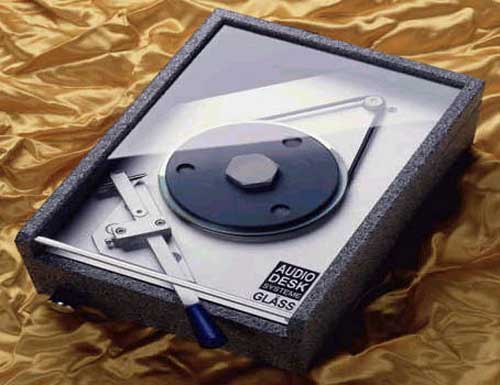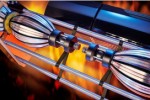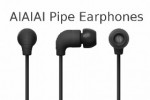Ok everyone, far from me to write about something that might start an argument, but here goes: The item below was found for sale on a New Zealand auction site.
I’ll let the description speak for itself (emphasis mine):
AUDIODESK Systeme CD lathe is a very effective CD sound improver. It bevels and trues the edge of CD’s to reduce laser reflection and vibration. This is the biggest upgrade I’ve heard for the CD format. It’s so obviously better from the first few seconds in a transparent system, my uncut discs are immediately recognizable now and sound less listenable and two-dimensional in comparison. It gets CD closer to high-end vinyl reproduction. Improves bass resolution, detail and dynamics, and reduces etch or glare. Blackening the bevel adds weight and smoothness. Soundstage depth and width and space around performers opens out. Similar to the improvement of SACD over CD all without softening or compromising dynamics as some CD mats and other treatments tend to do. Direct copies to cheap cut and blackened-edge CDRs (without even cutting the original) can sound significantly better than the original
 Sound better than the original? Really! How is this even physically (or conceptually) possible? Now, I’m pretty into my audio quality (although obviously not video quality, because I use $1.65 HDMI cables), but I’m nowhere near the type of nut that buys this type of thing. I really thought this was a joke when I first saw it – but it’s apparently for real.
Sound better than the original? Really! How is this even physically (or conceptually) possible? Now, I’m pretty into my audio quality (although obviously not video quality, because I use $1.65 HDMI cables), but I’m nowhere near the type of nut that buys this type of thing. I really thought this was a joke when I first saw it – but it’s apparently for real.

I’m still wondering which crazy audio device is the biggest audio snake oil around ( Send your nominations!), but I still don’t think it could hold a candle to this little piece of technology.
They also go on to say:
This is a “must have” product for any really interested in maximizing the potential of their CD/SACD collection. the price is reasonable and the construction and presentation of the product is outstanding. This results are simply quite staggering. – Richard S. Foster, HiFi+ issue 44, product of the year award
Here is a link to that review. Folks, if you’re buying a used car, stay very, very far away from this guy.
Maybe they’d work even better if you hooked up your Ultra Tweeters .
More info here , here and here .
At one point I’m going to compile all the crazy audio devices together in one article.





Clearly some folk have more money than sense and (it appears) have a greater concern for the medium than the message. We’ll soon have some arguing that orchestral instruments should be presented to the lathe in order to minimise sound reflections – or that the best conductors have their batons similarly treated in order to reduce disconcerting flashes of light and confusing those under his command. Just listen to the music guys and spend the money on a nice holiday!
How about the description Schumann resonator, Stein Harmonizers, Acoustic ART…….?
Reading about what they do, even for me, sounded a big unrealistic cr*p!
But guess what, I tried them and I have them! I really don’t care how they work, as long as they improve the sound!
I also use super tweeters (not ultra) and they work excellent in my system!
It always amuses me how some people know everything, or I should say they are born smart and don’t need to try anything because they already know the results! That’s a real blessing!!
Unfortunately, I’m not one of those and I need to try before I made my opinion/conclusion!
I’m using the DIY version of this trimmer and the difference is big and whoever, that I know, tried, they all heard and liked the difference!
For the record, my system is around 150k. Probably, at list 140k of snake oil, but who cares when it sound so damn good!
When a digital signal is compromised, the result isn’t degraded sound, it’s NO sound, at least nothing even resembling what you are supposed to hear. More like skips, jumps, and rebuffering. If you are that worried about light refraction, the solution is to polish the surface to reduce any scuffs, not a $700 cutting machine.
I have not tried the Cd lathe yet, but I’m not closed minded enough to automatically state
that this can’t work. I have an off-center CD that won’t play and this would probably fix it.
Those poo-pooing it should shut their mouth until they try it, then decide if it works or not.
if I can buy a used on then resell it for what i paid, i might give it a shot.
Well, I have one and have used it on all my Cd’s and I have to say it does improve the sound quality. But again if your not a Audiophile, you wouldn’t understand what I mean. Snake Oil! Not at all! Unless you have one, hard to understand why you would down play the usefulness? This Lathe is just another tool for those who want more from SACDs’ or DADs’. If you are looking for crisp clear sound this is a must have!
When the lathe is used competently, there is a noticeable improvement. (Ripping and re-burning to a better quality cd at low speed isn’t news as far as improving legibility of the digital info is concerned.)
An extended account proposing how this is possible — digital information notwithstanding — is given here: http://www.iar-80.com/page53.html
What’s at issue is the hazards of reading the digital info from the cd without distortions.
Why don’t ‘digital info cannot be improved’-apriorist give it a fair try by listening before dismissing the product as snake oil?
Nonsense. Total Nonsense. I would not recommend subjecting your valuable CD collection to any kind of ‘lathe’. If you do, the only sound difference will probably be the skipping and jumping of your valued CDs. Don’t buy this c*** and as for ultra tweeters, I still can’t decide if it is actually a joke or not. But I have seen this c*** around before.
I fully relate to the scientific arguments presented here. I understand the arguments and think they make sense.
I also relate to those who hear a difference. At our audio club we we asked to listen to two identical discs. We were not told the difference, although the very exercise implied that there was a difference. After listening to both of them, we were asked which one we preferred. From the 20-30 listeners, there was almost an unanimous preference for one over the other. It was perceived as clearly more spacious, three-dimensional and ‘live’.
We were then told that the vastly preferred disc had been treated in this way. That is the one and only time I have ever been exposed to the system.
I guess it could be argued that the process had not been scientifically scrutineered, but the two discs were available for examination afterwards. Rightly or wrongly, I did not take advantage of the opportunity.
I do believe that true science tests its theories. If a theory appears not to be supported by experiment, then both the the theory and the experiment are re-examined. This is the way science progresses.
Theorists – you are theoretically correct! Audiophiles – if my own experience is a valid one, you are experimentally justified in your assessment.
What we need is someone who has the open-mindedness, the expertise, and perhaps the creativity to synthesise the two sides.
I’m with JW – I had 3 discs treated by a guy who was selling the service on eBay – and the difference is stunning. Really.
I can verify that I have now actually used one of these on examples of both SACD and of CD, and here’s the thing.
You can throw as much techno-balls-talk at me if you like, saying this that and the other – but the simple truth is this – if my wife notices the audible difference about 30 seconds before I do (I was still thinking about it at this point) then you have to know that somethings working well.
She’s never heard anything different in all my “enhancements” before me… ever. She heard the CD before, heard the CD after and noticed the differences immediately!
So there you go. I’ve heard the differences – I am happy – i would recommend it to anyone!
Thanks
JW
“This is pure cr-p. It’s freaking digital people, it doesn’t matter if lasers bounce around or what not, since the data decoded is DIGITAL the quality of the sound doesn’t change no matter how cr-pp-ly it is read from the disk.”
No – audio CD error correction is a lossy algorithm. Digital does not mean “magically impervious to error” or “sounds the same on all equipment” as many claim.
Of course, this does not mean the lathe is of any use. CDs are already precision manufactured to the required specifications and it seems best not to muck about with that.
Just because it’s digital doesn’t mean that there aren’t ways the stream can be compromised. Digital jitter, quality of transmission media, etc all affect the system. At the very least you could think of balancing a tire. The unbalanced cd/dvd/etc would have to do more corrections for timing variances and missing data. There are some physics principles that could be affected, however I have not tried this device but would not be willing dismiss it without trying it.
This isn’t a new concept. None of you guys remember the “CD pen” back in the day? It was a green pen that you used to paint around the edge of the disc – apparently it made the sound better by minimizing refractions. There is possibly some physics behind this – it’s said that some laser light is inevitably refracted and bounces around – although I was just a kid and never tried it.
The bitstream delivered to the DAC almost inevitably contains a large number of errors, doesn’t it? I’ve seen tables that give the error rates of different CD media.
It should in theory be easy to measure whether the device in question actually does anything. If anyone can answer this question it would be Bob Katz.
For the last time, IT’S A DIGITAL DATA STREAM, written with an ERROR-CORRECTING CODE. As long as the number of transmission errors doesn’t get high enough to overwhelm the correction algorithm, the bitstream delivered to the DAC is an EXACT copy of the one that came out of the ADC back at the studio. If the disk is dirty or scratched enough to make a difference, it makes an obvious difference, as in dropouts, not the sort of “Only my Golden Ears can detect it” stuff that audiophools love to jerk off over.
I’ve got to give Teleportation Tweak points for sheer chutzpah. Of course, the Federal Trade Commission may give them something else, like a fraud charge.
I have no idea if this product does work or not… but the idea is definitely sound. Before I explain, think about fiber optic cable or the plastic in your car stereo dash — think about how easily it carries the colored light to illuminate your controls. Then, look at the LCD on your computer. It’s no secret that light loves to bounce around in glass and plastic. The argument for improving the sound of cds is to blacken or in this case lathe the disc so as to minimize refractions from the laser that will cause errors in the reading of the disc. This is not a binary 1101 = 1101 argument like your HDMI cables, this is a fact that the actual data stream can be compromised because the laser isn’t reading the disc properly. Now I have no comment on how much this will improve sound quality and I personally wouldn’t worry about my cds (but im a vinyl guy) — but I do have to say, the science is sound. So, just because it seems silly doesn’t mean it is…
This is pure crap. It’s freaking digital people, it doesn’t matter if lasers bounce around or what not, since the data decoded is DIGITAL the quality of the sound doesn’t change no matter how crappily it is read from the disk.
Anyone with a brain should know this.
I’ve read the “reviews” on this page with interest. It would appear that those who use CAPITAL LETTERS and preach on about how the lathe can’t possibly work haven’t actually tried it and those who claim it works, have actually used it! To quote Mochan “anyone with a brain” should actually try a product before dismissing it. One of my friends has one of these lathes and swears that it works wonders. Admittedly, he is using it in a system that cost in excess of £15k so the system picks up the minutest details in a recording, but it definitely works. I have heard it myself on his system and you can here it works. We bought identical CD’s, lathed one and then using a third party, did blind listening tests. You could tell which one was which. Simple, before you say something can’t possibly work, try it first!
Forgive them lord for they’re ignorance, has they don’t know what they’re saying … Bunch of ignorants, try it before you comment it… yu might be surprised 😉
crazy audiophiles !
If you ask me this is the worst (best?) snake oil today:
[b]Teleportation Tweak[/b] – Performed during telephone call to Machina Dynamica. Teleportation Tweak takes 20 seconds. $60.
YEs, thats right….call Machina Dynamica, fork over $60 and the ‘magiclly’ improve your audio system.
I agree with Danny Keaton 200% !!11!!eleven!!!
And not only can you vastly improve the sound of your CDs, DVDs etc.; no, it also works wonders on software CDs! After I treated my Windows installation disc with this marvellous device and re-installed, my system runs without a glitch, while before it crashed several times a week!
Nice one, audio world. I’m sorry but a CD is sampled (generally speaking in the consumer world) at 44.1khz. There is no physical way to change this, nor is there any amount of lowpass filtering one can do to change the originally digitized Nyquist frequency. I’m sorry but all this product claims to do would only be done by different engineering/mixing and/or a better sound component system, speakers, and a more acoustically interesting space. Alright let’s all make sweet love tonight, all hail the ULTRA TWEETERS!
I have been a long time user and happy customer of the AUDIODESK Systeme CD lathe for many years now. The boost in quality is simply amazing, when I listen to my Beatles CDs now I often get confused about whether I am actually sitting in a room jamming with the Beatles! And don’t even get me started on the improvement to DVDs. Now I used to be a big fan of the Blu Ray and HD/DVD format, thinking the 1080p picture was amazing. But after watching a DVD that had been through my AUDIODESK Systeme CD lathe, the resulting image quality made Blu Ray look like VHS! DVDs treated with the AUDIODESK Systeme CD lathe now look like they are in 2260p resolution, the added detail is just simply amazing, almost like watching a hologram from the future!
I can whole heartedly recommend the AUDIODESK Systeme CD lathe to everyone who is at least an avid fan of music or movies.
“Improves bass resolution.” Do you mean in the 01000101 to 01001100 range or in the 00100111 to 10011001 range? That’s awesome!!
This goes way back to the beginning of CD, this obsessive crap. Anyone remember the green sharpie cure for CDs from back in the ’90s?
I love this!
As a true audiophile myself this is just rich. I could start trolling here and reference tube amplification here, but then we’d get into a debate over the quality of sound reproduced with and without sound processing typically included in tube amps.
For sheer chutzpah, I haven’t seen anything to beat the expensive wooden volume control knob, although the Ultra Tweeter comes close. I wish I could meet some of the people who buy this b_llsh_t; I could get some good laughs while making a pile of money.